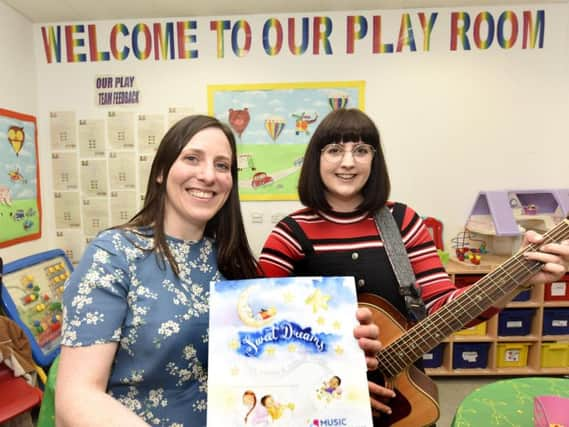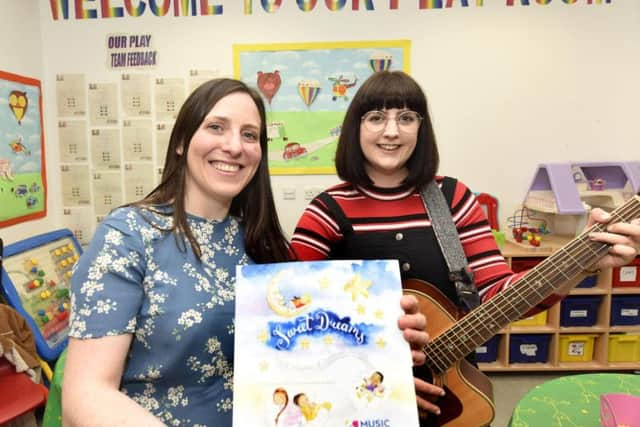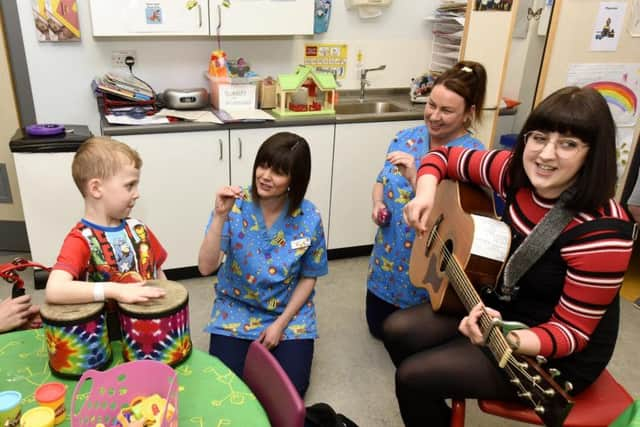Musical magic helps young Fife patients and their families


But a new scheme is hoping to make the experience a bit easier by bringing some calm and relaxation to parents and children who find themselves in the children’s ward in Victoria Hospital, Kirkcaldy.
The charity Music in Hospitals & Care (MiHC) has developed a new Lullaby Hour songbook and audio CD for families of sick children – and it was launched at the town hospital earlier this week.
Advertisement
Hide AdAdvertisement
Hide AdThe charity arranges for carefully selected musicians to sing soothing lullabies and play calming melodies for premature babies and sick children in hospitals and hospices.


Lullaby Hour delivers wonderful melodies at the bedside and cotside.
The music soothes young patients, helping to bring relaxation and restful sleep, as well as helping to calm and reduce stress for parents at very difficult times.
You may also be interested in:New bakery to open in Kirkcaldy creating 15 jobsMan in hospital after car crashes through wall in KirkcaldyVideo HMS Queen Elizabeth passes under Forth Bridge on way past Fife
Advertisement
Hide AdAdvertisement
Hide AdLullabies are a wonderful way to connect with children and MiHC has now produced an illustrated book which gives a flavour of the music sessions themselves – available to take home or download – delivering special memories for families to treasure.


Sarah Johnston, partnership development manager for Music in Hospitals & Care Scotland, told the Press: “Lullaby Hour was initially developed at the Children’s Heart Unit (CHU) at The Freeman Hospital in Newcastle-upon-Tyne where MiHC was delivering daytime play concerts on the unit.
“Sometimes the children and babies were too ill to participate, so after discussions with the play specialists at the hospital, MiHC trialled early evening bedside sessions to help the children settle.
“This was where the idea for Lullaby Hour came from. Now we are taking the songbook UK-wide and using it in hospitals across the country, including here at Victoria Hospital in Kirkcaldy.
Advertisement
Hide AdAdvertisement
Hide Ad“The songbook includes ten lullabies – some of them are recognisable, like Ally Bally – and there are some other ones which aren’t as well known but are soothing for children in intensive care.”
Sarah said feedback has been really positive.
“One parent whose daughter was in intensive care and couldn’t come along to the music session in the ward said it really made a difference,” she said. “During the session her daughter’s heart rate decreased as she relaxed while listening to the music - you could see the effect on the monitor.”
The charity has been coming to Victoria Hospital every fortnight for around 15 years. Sessions last around an hour and usually take place in the playroom.
“We can do a mix of different music – it can be more upbeat or we can do lullabyes and do a more one-to-one session, making it more bespoke for the child.
Advertisement
Hide AdAdvertisement
Hide Ad“Our musicians in Kirkcaldy are David Hood and Amy Rayner. They both sing, play guitar and have percussion instruments which they encourage the children to play and join in.”
Pamela Shannon, health play worker at Victoria Hospital, said the interactive live music sessions have really made a difference: “Some of our more severely ill patients in our ICU children’s ward have been unable to attend wider ward sessions in the past so the lullabye songbook is ideal for them. We’re delighted they will continue to enjoy the health and wellbeing benefits of live music without having to move from their bedsides.”
Lynzie Gow, whose son Bradley (4) was in the children’s ward at the Vic after developing an infection in his shoulder, enjoyed seeing him taking part in a session: “This is right up his street and it has helped take his mind off being in hospital.”
Since its inception, Lullaby Hour has won a national award for innovation from the ScottishPower Foundation, along with a grant to support the project in more hospitals across the UK.
Advertisement
Hide AdAdvertisement
Hide AdMiHC also received funding from Arts Council England towards the development of the Lullaby Hour Songbook. The Lullaby Hour CD and Songbook has been produced to enhance the sessions and will be available for parents and families to access online at www.mihc.org.uk/scotland/ or as hard copies.
About Music in Hospitals & Care
MiHC began in 1948. Sheila McCreery, an employee of the then recently established Arts Council, first conceived the idea of a project bringing live music into hospital, following the closure of the Entertainments National Services Association in 1946. Sheila organised a successful pilot project of 22 concerts, before the Council for Music in Hospitals (CMH) was established in 1948 with a grant of £1000. The policy at the time was to provide concerts of ‘serious’ classical music, generally chosen on behalf of the patients by the ‘Medical Superintendent’ of the hospital. By the late 70s, more musicians were brought on board with wider repertoires – from jazz to popular music – to appeal to a wider audience in different healthcare settings, as well as hospitals.
CMH was rebranded to Music in Hospitals in the late 1990s, and last year the charity added ‘& Care’ to its name to reflect the many different healthcare venues it covers.
Today Music in Hospitals & Care reaches over 100,000 people in care each year who are unable to access live music within their communities. The first office was established in Scotland in 1980.